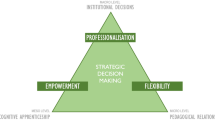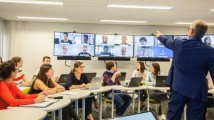Abstract
This paper argues that the conceptions of ‘space’ (and increasingly ‘time’) in the discussion of ‘the university’ (in its most transcendent sense) have gone through four distinct phases in the UK. Using a Heideggerian conception of ‘space’ where usefulness is more important than proximity, the ‘ancient’ universities were ‘useful’ to the gentry and thus were ‘closer’ to them than to the excluded ‘local’ poor in the institutions’ vicinities. The ‘civic’ universities on the other hand stressed ‘localism’ as part of their mandate – to educate the people of their locality (but only those of the new industrial middle class). The ‘Robbins’ universities were a partial return to the ‘ancient’ notion of learning as a ‘lived’ activity, providing scenic landscapes on green-belt campuses where students could ‘retreat’ from the ‘real world’ for the duration of their studies. The ‘spatial’ quality of these places was thus part of a conception of higher education as ‘lifestyle choice’ where young people moved away from their locality to study. As such ‘proximity’ was an issue only insofar as the greater the distance from one’s point of origin the better for successful immersion in the growing student ‘culture’. The ‘new/post-1992’ universities partially retained their polytechnic mandate to educate local people, but embraced a colonialist impulse regarding local space usage. ‘ ‘The discussion can be further refined to argue that these four stages are merely two phases which have repeated themselves: from ancient ‘exclusivity’ to civic ‘localism’ and back to Robbins era ‘exclusivity’ and thence to post-1992 ‘localism’ once more’. The opening up of higher education via the Internet in the late 20th and early 21st centuries provides for the possibility of the growth of entirely non-spatial and asynchronous learning experiences, and as such we may well be on the verge of the fifth stage of university development.
Similar content being viewed by others
References
Anderson, R.D. (1995). Universities and Elites in Britain since 1800. Cambridge University Press.
Andrews, J. (1996). ‘Communities, universities and the wider educational scene’, in Elliot, J., Frances, H., Humphries, R. and Istance, D. (eds.), Communities and Their Universities. London: Lawrence and Wishart.
Baudrillard, J. (1973). ‘The mirror of production’ (Translated by Mark Poster), in Poster, M. (ed.), (1988) Jean Baudrillard Selected Writings. Cambridge: Polity Press.
A. Cobban (1988) The Medieval English Universities Scolar Press London
A. Cobban (1990) Universities in the Middle Ages Liverpool University Press Liverpool
A. Cobban (1999) English University Life in the Middle Ages Ohio State University Press Columbus
J. Collins (2000) Heidegger and the Nazis. Postmodern Encounters Series Icon Books New York
Dearing (1998) ArticleTitle‘The unauthorised chapter of “The Dearing Report” Journal of the Institute of Economic Affairs 18 IssueID3 4–10 Occurrence Handle10.1111/1468-0270.00102
A. Doring (1999) ArticleTitle‘Information overload’ Adults Learning 10 IssueID10 8–10
M. Featherstone S. Lash (Eds) (1999) Spaces of Culture: City–Nation–World Sage London
Friese, H. and Wagner, P. (1999). ‘Not all that is solid melts into air: Modernity and contingency’, in Featherstone, M. and Lash, S. (eds.), Spaces of Culture: City– Nation–World. London: Sage.
A. Gorz (1982) Farewell to the Working Class: An Essay on Post-Industrial Socialism (Translated by M. Sonescher) Pluto Press London
T. Hardy (1896) Jude the Obscure (Everyman’s Library Edition) David Campbell Publishers Ltd London
Harris, P. and McVeigh, T. (2002). Student Takeover Alarms Cities, The Observer, 21/7/2002. www.observer.co.uk
M. Heidegger (1962) Being and Time (Translated by MacQuarrie, J. and Robinson, E.) Black well Oxford
Heidegger, M. (1954). ‘Building dwelling thinking (translated by Hofstadter, A. 1971)’. in Farrell-Krell, D. (ed.) (1993) Basic Writings: Martin Heidegger. London: Routledge.
R. Hoggart (1996) The Way We Live Now Pimlico London
A. Kee (1970) ‘Demystifying the university’ D. Rubenstein C. Stoneman (Eds) Education for Democracy. Penguin Books London
K. Kumar (1978) Prophecy and Progress Penguin Books London
S. Lash J. Urry (1994) Economies of Signs and Space Sage London
H. Lefebvre (1991) The Production of Space (Translated by Nicholson-Smith, D) Blackwell Oxford
A. Marks (1999) ArticleTitle‘Taking the water to the horse’ Adults Learning 10 IssueID7 11–13
A. Marks (2000a) ArticleTitle‘In search of the local university’ Journal of Further and Higher Education (Carfax) 24 IssueID3 363–371 Occurrence Handle10.1080/030987700750022280
A. Marks (2000b) ArticleTitle‘Academia.Com: Reflections on the (virtual) realities of Internet delivery and its implications for non-traditional learners in Scotland’ Scottish Journal of Adult and Continuing Education (Scottish Community Education Council) 6 IssueID1 85–97
A. Marks (2000c) ArticleTitle‘Lifelong learning and the breadwinner ideology’ Educational Studies (Carfax) 24 IssueID2 303–320 Occurrence Handle10.1080/03055690050137123
D. Matheson (2000) ‘Scottish education, myth and mists’ D. Phillips (Eds) The Education Systems of the United Kingdom. Oxford Studies in Comparative Education. Symposium Books Oxford
Mohan, J. (1996). ‘Reconnecting the academy’, in Elliot, J., Frances, H., Humphries, R. and Istance, D. (eds.), Communities and Their Universities. London: Lawrence and Wishart.
S. Mulhall (1996) Heidegger and Being and Time Routledge London
M. Phillips (1996) All Must Have Prizes Little Brown and Company London
(Lord) Robbins (1966) Universities in the Modern World MacMillan/New York: St. Martin’s Press London
E. Robinson (1968) The New Polytechnics, The People’s Universities Penguin Education Special, Penguin Books Middlesex
N. Selwyn S. Gorard (1999) ArticleTitle‘Can technology really widen participation’ Adults Learning 10 IssueID6 27–29
P. Shore (1991) The Myth of the University United Press of America, Lanham New York, London
M. Simey (1996) The Disinherited Society Liverpool University Press Liverpool
T. Veblen (1899) Theory of the Leisure Class Dover Thrift Press New York
G. Walden (1996) We Should Know Better Fourth Estate London
Author information
Authors and Affiliations
Rights and permissions
About this article
Cite this article
Marks, A. Changing Spatial and Synchronous Structures in the History and Culture of Learning. High Educ 50, 613–630 (2005). https://doi.org/10.1007/s10734-004-6366-9
Issue Date:
DOI: https://doi.org/10.1007/s10734-004-6366-9




